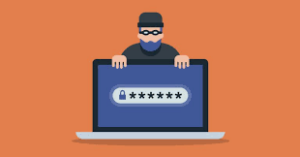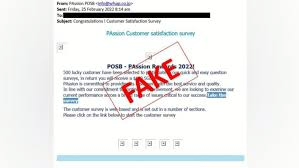It began with an unexpected phone call from your bank’s fraud department, a voice on the line warning you of suspicious activity. Shortly after, an enticing offer for a dream vacation landed in your inbox and then came an alluring job advertisement that seemed too good to be true. It’s a reality we all face: scammers have developed sophisticated methods to infiltrate our lives and take our money, employing tactics that are becoming increasingly deceptive. In today’s world, even age-old schemes are being revitalised through technology, enabling these con artists to craft pitches that are not only more believable but also more perilous than ever before.

One of the most alarming developments is the ease with which criminals can obtain sensitive personal information about individuals—everything from your birthdate to your Social Security number. With this data at their disposal, they can masquerade as trusted figures, such as bank representatives, creating a façade of legitimacy that can be difficult to see through. Adding another layer of complexity is the emergence of artificial intelligence; it has given rise to “deepfakes”—incredibly lifelike videos that mimic the likenesses of people you may know, including well-known executives and celebrities. These fabricated images are designed to disarm you, coaxing you into letting your guard down and parting with your hard-earned cash.
As John Breyault, who oversees the National Consumers League’s Fraud.org initiative, points out, “Americans are continuing to lose substantial amounts of money—even those who believe they are too savvy to fall victim.” In 2023 alone, the United States saw a staggering increase in fraud claims, exceeding 2.6 million—a record-breaking figure—with estimated losses reaching around $10 billion, according to the Federal Trade Commission. The actual impact is likely even more significant, as many victims choose not to report their experiences to law enforcement or regulatory bodies.
Specific communities find themselves particularly susceptible to these digital deceptions. According to Consumer Reports’ 2024 Cyber Readiness Report, Black and Latino consumers are more than twice as likely as their white counterparts to fall prey to high-tech scams. Older adults also face significant risks, especially those who might be isolated or lack access to resources that could help protect them from these threats.
In this digital age, awareness and vigilance are paramount. Understanding scammers’ tactics can arm you against their manipulative strategies, making it essential for everyone to stay informed and cautious.

The Bank Fraud Incident: Your Account Has Been Breached!
Meet Cathy M., a 70-year-old widow residing in Santa Clara County, California. With a sharp financial mind and a cautious nature, Cathy prides herself on being savvy with her money. To safeguard her finances, she has implemented strict measures, such as diverting calls from unfamiliar numbers directly to her voicemail. She would never entertain the idea of sharing her banking details over the phone.

However, in September, an unexpected call disrupted her routine. The name “Wells Fargo” flashed across her caller ID, and a man introduced himself as a representative from the bank’s fraud division. Alarm bells rang in Cathy’s mind, yet the urgency in his voice piqued her curiosity. He informed her that there had been suspicious activity involving her account, specifically charges linked to Texas—an unfamiliar location for Cathy.
“How can I trust you are genuinely from Wells Fargo?” she inquired, scepticism evident in her tone.
To alleviate her concerns, the caller recited the last four digits of her Social Security number—personal information she believed only a legitimate bank representative would possess. Relieved and eager to assist in averting any potential fraud, Cathy let her guard down.
What followed was a gripping 90-minute conversation where the scammer skillfully extracted sensitive banking information from her. He requested that she jot down and read out various numerical sequences he labelled as “transaction IDs.” While Cathy thought she was playing an active role in preventing fraud, the con artist—or perhaps an accomplice—was busy manipulating her account details. Under the guise of Cathy, he altered the contact phone number linked to her account and proceeded to call Wells Fargo, falsely claiming that he was authorising a wire transfer of $25,000 to settle a contractor’s bill.
In the meantime, an alert email from Wells Fargo reached Cathy’s inbox, warning her about unusual activity. Unfortunately, she was utterly oblivious to this notification; the scammer had kept her entirely engaged, spinning tales about an ongoing investigation and advising her not to check her bank account for a few hours.
Eventually, after what felt like an eternity, Cathy ended the call. A sense of unease washed over her as she reflected on the conversation. Acting swiftly, she dialled Wells Fargo using the official number listed on their website, hoping to clarify the situation and protect her hard-earned savings.
Safeguarding Yourself from Scams
In today’s digital age, the threat of scams looms more significant than ever, mainly through a deceptive practice known as spoofing. This technology allows fraudsters to disguise their phone calls or messages to make them seem as though they are coming directly from your bank. To bolster their ruse, these criminals often acquire sensitive personal data—like Social Security numbers and bank account details—through illicit channels on the dark web or messaging platforms such as Telegram. Protecting yourself from such threats requires vigilance and careful action. Here’s how you can fortify your defences:
First and foremost, it’s essential to verify the authenticity of any communication you receive. When contacted by a supposed representative of your bank or a government agency, don’t automatically trust the caller ID; it can easily be manipulated. Instead, take a moment to hang up and look up a verified contact number for the institution online. It’s wise to redirect all unknown numbers to voicemail, ensuring that you don’t inadvertently engage with a scammer.
Next, guard your financial information as if it were a precious treasure. Remember that no legitimate bank employee should ever request sensitive details such as your username, PINs, one-time access codes, or passwords. Banks are aware that such information is highly confidential and should remain secure. Instead of asking for these credentials, a genuine bank representative will typically send you a one-time code that you will enter on your own, safeguarding your privacy.

Another critical piece of advice is to resist the pressure to act quickly. Scammers thrive on urgency; they may insist that immediate action is necessary to protect your funds. This tactic is designed to catch you off guard and push you into hasty decisions. Don’t fall for this trap! Instead, take a deep breath and reach out to your bank or the relevant agency yourself to verify whether there is any truth to the claims being made.
By remaining cautious and informed, you can significantly reduce the risk of falling victim to scams. Stay alert, protect your personal information fiercely, and remember that when in doubt, it’s always best to verify before responding.
The Deceptive Deal: A Cautionary Tale of Online Selling
Meet Kathy D., a dedicated professional immersed in environmental research, policy, and education for various federal entities and nonprofits in the vibrant city of Washington, D.C. Recently, Kathy found herself in possession of a dining room table that she no longer needed. With a sense of optimism, she decided to list it for $250 on Facebook Marketplace.
Almost immediately, Kathy received a message from a potential buyer eager to make a deal without even seeing the table first. Given the attractive price she had set, it seemed reasonable for the buyer to want to act swiftly. “I was thrilled at the prospect of finally selling this table,” Kathy reminisces with a mix of excitement and naivety.

As their conversation progressed, the buyer claimed to be Swedish and explained that any errors in her messages stemmed from her limited English skills. To ease any doubts, she sent Kathy a photo, presenting herself as a striking blonde woman with Scandinavian features. Kathy felt reassured; after all, this seemed like a genuine interaction.
However, the buyer soon made an unusual request. To verify that Kathy was indeed a legitimate seller, she asked if Kathy could send her $200 via Zelle, promising to return that amount along with the table’s price immediately. Although this request struck Kathy as peculiar, she was unfamiliar with the norms of transactions on Facebook Marketplace. Additionally, she felt compelled to prove her integrity and was eager to finalise the sale.
Caught in a web of uncertainty but driven by her desire to sell, Kathy reluctantly complied and transferred the money. But soon after, another request arrived—this time asking for funds to cover insurance in case the table arrived damaged. Frustrated and on the verge of backing out, Kathy ultimately decided to send this second payment as well. However, her bank flagged this transaction as suspicious, raising alarms about the legitimacy of the situation.
At the buyer’s insistence, Kathy contacted her bank, hoping to resolve the issue and push through the payment. It was during this conversation with the bank representative that a light bulb went off in Kathy’s mind. The questions asked made it painfully clear that she had fallen victim to a scam.
When approached for a statement, Meta, the parent company of Facebook Marketplace, acknowledged the growing issue and highlighted their ongoing efforts to enhance technology aimed at eliminating such fraudulent threats from their platform.
Staying Safe While Selling Online
Engaging in online buying or selling can be fraught with risks, as Kathy’s experience illustrates vividly. Always remain vigilant and informed to protect yourself in these transactions.
The Employment Scam: A Cautionary Tale of a (Phony) Job Offer
Meet Courtney T., a resident of Santee, California, who nearly fell victim to a deceptive job scheme that could have cost her $500.

In the year 2023, Courtney found herself at a crossroads in her career, eager for a new opportunity. As she diligently browsed through countless online job listings, a position at Luminis Health—a nonprofit organisation dedicated to healthcare—caught her eye. The role promised part-time hours and a salary that seemed quite attractive. Enthusiastically, Courtney submitted her application and, to her surprise, received an immediate response from an individual claiming to represent Luminis. This person introduced himself as Andrew, the “online interview manager” for the company.
Their communication took place entirely through Microsoft Teams, where Andrew guided Courtney through a series of steps that included answering questions and providing references. Although they never spoke directly or met face-to-face, Courtney was soon informed that she had been selected as a “good fit” for the role and was offered employment.
However, the excitement was short-lived when Andrew informed her that she would need to purchase specific computer equipment to commence her new position. He reassured her that the company would cover these expenses by sending her startup funds. When Courtney checked her bank account, she saw that the promised amount was indeed pending. It was at this moment that Andrew instructed her to send $500 via Zelle to a vendor associated with the company using a Yahoo email address.

Although something felt off about this request—after all, it was unusual for a company to ask a new hire for money—Courtney rationalised it as a possible necessity stemming from post-pandemic procedures. Despite her initial hesitation, she attempted to transfer the funds. Fortunately, her bank intervened, suspecting a potential scam, and halted the transaction.
Feeling uneasy about the payment issues, Courtney reached out to Andrew for clarification. In response, he suggested alternative payment methods like Apple Pay or Cash App. This sequence of events raised red flags for Courtney, and she began to suspect that she might be caught in a scam. Thankfully, she had not yet resigned from her current job; she narrowly avoided being unemployed and losing $500 in the process. Luminis Health has since acknowledged awareness of such scams and is committed to safeguarding job seekers from similar experiences.
Protect Yourself Against Employment Scams
It’s essential to remain vigilant when navigating the job market, as many fraudulent postings are accompanied by convincing company websites, fake LinkedIn profiles, and seemingly legitimate recruiters with detailed social media presence. Employment scams often target individuals searching for jobs, making awareness and caution paramount in today’s digital landscape.
The Travel Deception: A Dream Vacation That Turned Sour
In the sun-drenched city of Fresno, California, an engineer named James Orr lived contentedly with his wife. One seemingly ordinary day, a vibrant brochure slipped through their mailbox and piqued James’s interest. This colourful pamphlet belonged to a company called Primo Network Adventures, and it was adorned with enticing images of blissful travellers lounging aboard luxurious cruise ships and sinking into plush first-class airline seats. The glossy flyer hinted at an incredible offer: a week-long condo rental coupled with a thrilling cruise experience, not to mention the tantalising opportunity to win extravagant prizes, including a Tesla. Intrigued by this prospect, James and his wife decided to investigate further by attending an informational session scheduled at a local hotel.

Upon arrival, the couple was introduced to the ins and outs of Primo’s elaborate 10-year travel membership program. This program promised not only a fabulous condo rental but also substantial discounts on exclusive travel bookings. However, the price tag was steep—nearly $12,000 upfront, alongside recurring annual fees.
One aspect that caught James’s eye was Primo’s Facebook page, brimming with breathtaking images of idyllic beaches, lavish resorts, and captivating attractions. The allure of a password-protected booking portal further convinced him of the company’s credibility. Though unfamiliar with the brand, James felt drawn in by the promise of significant savings.
Nevertheless, doubts lingered in his mind. He clearly expressed his reservations about the hefty $12,000 fee. In response, the sales team inquired about his budget. With the funds from a recent consulting job burning a hole in his pocket, he proposed $7,000—a figure they readily accepted. After some discussion, James found himself signing an eight-page contract that he later admitted he hadn’t scrutinised closely enough.

What unfolded next was an unfortunate revelation: the Primo membership was merely a modern iteration of an age-old timeshare scam. It appeared that the company had targeted affluent retirees like James by acquiring their personal information from data brokers. To his dismay, James discovered that he could never take full advantage of the supposed deals; they were either unappealing or unavailable during times he could travel. As time passed, both he and his wife became increasingly sceptical of any correspondence they received from Primo.
Ultimately, James used his membership just once—to reserve a modest motel room for a high school reunion. His savings from that single transaction amounted to a mere $100.
Consumer Reports attempted to contact Primo for their side of the story, but the company’s website seemed unresponsive.
Preventing Scams Before They Begin
In a world where scams lurk around every corner, it’s crucial to arm yourself with the knowledge to fend them off before they can wreak havoc on your finances. Here’s a guide to help you stay one step ahead of potential fraudsters.
First and foremost, consider the information you share in public forums. The digital age has made it all too easy to overshare, but this can be a double-edged sword. When you post personal details on social media—whether it’s your phone number, home address, or even financial information—you’re essentially handing scammers the tools they need to craft a convincing narrative designed to ensnare you. Experts advise keeping your private life under wraps; think carefully before posting pictures of your home, discussing personal health issues, or naming family members. Every detail counts when it comes to your safety.
Next, be wary of any communications that create a sense of urgency. Scammers thrive on pressure tactics, often claiming that immediate action is necessary to avoid dire consequences. You might receive a call from someone claiming to be a law enforcement officer or an IRS agent demanding swift payment to avert a hefty penalty. Others may impersonate tech support personnel, insisting they need access to your computer to thwart an ongoing cyberattack. Remember, the push for rapid response is a classic warning sign of a scam in progress.

It’s also wise to adopt a strict policy against sharing sensitive information. Regardless of how convincing the request may seem, never divulge personal data to anyone who reaches out to you—be it through email, text messages, phone calls, or even in-app notifications. This encompasses not just bank account numbers and passwords but also critical details like your date of birth, home address, Social Security number, and anything else that could be exploited for financial gain. Protecting this information is paramount.
Lastly, when in doubt, seek counsel from trusted friends or family members. If something feels off or too good to be true, don’t hesitate to discuss it with others before making any decisions. They might have encountered similar situations or can provide a fresh perspective that helps clarify the reality of the situation. Engaging with a neutral party can often illuminate potential red flags that you may have overlooked.
By following these guidelines, you can fortify yourself against scammers’ ever-evolving tactics. Awareness and caution are your best defences in this digital landscape where threats are omnipresent. Remember: prevention is far more effective than dealing with the aftermath of a scam. Stay vigilant and protect your financial well-being.

Maxthon: A Guiding Light in the Digital Realm
As we find ourselves navigating through an age defined by swift technological growth, the significance of user experience cannot be overstated. The nature of our online interactions is constantly shifting, making it essential to reflect on the various aspects that shape our digital identities. When it comes to selecting a web browser—our crucial portal to the vast expanse of the internet—thoughtful decision-making becomes imperative. In a landscape rife with potential dangers, prioritising security and privacy is more important than ever. Amidst the multitude of choices available, one browser clearly rises above the rest: Maxthon. This groundbreaking tool has positioned itself as a key player in the market, adeptly addressing user challenges while remaining completely free of charge.
What sets Maxthon apart is its exceptional compatibility with Windows 11. It boasts an extensive array of advanced features and tools meticulously crafted to enhance online security. With robust ad-blocking capabilities and a thorough set of anti-tracking solutions, Maxthon creates a haven for its users in the digital world. In the highly competitive browser market, Maxthon has carved out a distinctive niche for itself, largely thanks to its seamless integration with Windows 11, making it a preferred option among various alternatives.

As users traverse the constantly changing terrain of web browsing, Maxthon has garnered a solid reputation for its dependable performance. Its steadfast commitment to delivering a secure and private browsing experience truly distinguishes it from many rivals. Fully cognizant of the myriad threats lurking online, Maxthon dedicates itself to safeguarding users’ data through advanced encryption technologies. This strong emphasis on security not only enriches the overall browsing journey but also cultivates a profound sense of trust among its user base.
In this rapidly evolving digital landscape, where each click can lead to new challenges, Maxthon stands as a beacon of reliability and innovation. With its unwavering focus on user safety and privacy, it offers not just a means to access information but a sanctuary where users can explore freely and securely, knowing their digital footprints are well-protected.
